Broadway's West Side Story Opens to Protests
The controversial and much-anticipated production saw the biggest demonstration outside its theater last night.
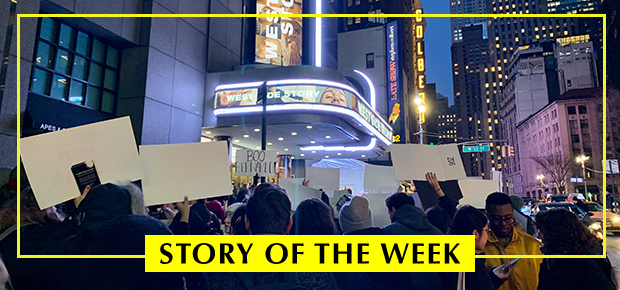
(© Zachary Stewart)
This Story of the Week will explain what the protests are all about and explore the chances of a reconciliation between the parties. Spoiler: They're pretty slim.
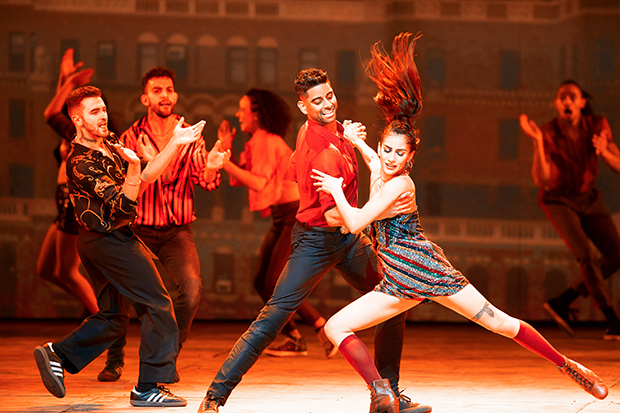
(© Jan Versweyveld)
What are the West Side Story protests about?
As I explained in my earlier story, the protests outside West Side Story are in response to the casting of Amar Ramasar as Bernardo, the leader of the Sharks.
In 2018, Ramasar was fired from his position as a dancer with the New York City Ballet for sending explicit photos of his co-worker and girlfriend, Alexa Maxwell, to Chase Finlay, another male dancer. Finlay also sent Ramasar explicit photos of his then-girlfriend, Alexandra Waterbury (who has brought a civil suit against the ballet, Finlay, Ramasar, and three other defendants). An arbitrator later ordered the Ballet to reinstate Ramasar when his union challenged the dismissal. He was cast in West Side Story shortly after.
The casting has caused consternation within the theatrical community, with some questioning why lead producer Scott Rudin would hire a performer with Ramasar's history. In December, Northeastern University student Megan Rabin started an online petition calling for Ramasar to be removed from the production (it has since garnered over 48,000 signatures). On January 24, LaGuardia High School student Paige Levy brought a dozen demonstrators right to the theater's doorstep with the first of several street protests. Last night, the opening night of West Side Story, there were about 80.
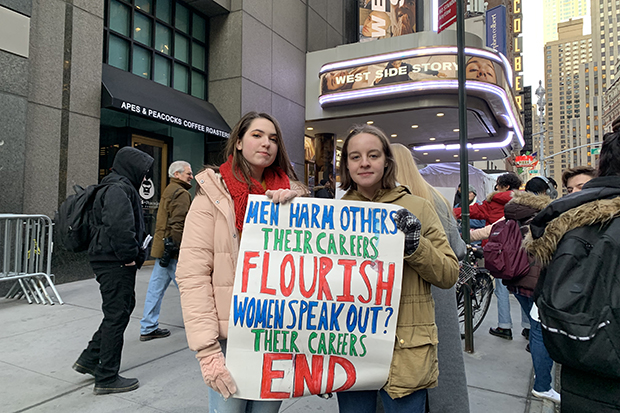
(© Zachary Stewart)
What happened at the opening night protests?
Protesters started arriving at 5pm, 90 minutes before the 6:30 curtain. While some held professionally printed signs reading "Boo Bernardo" and "We Stand with Alexandra Waterbury," others brought their own homemade signs like the one Levy carried, which read, "Men harm others, their careers flourish. Women speak out? Their careers end."
I spoke with Levy and Rabin shortly before the protest kicked off, and both were enthusiastic about the turnout. "At first, I really expected it would just be me with a sign outside the theater," Levy said about the first protest. She now thinks that both she and the producers underestimated the level of rage people feel about sexual misconduct in the workplace, and the expectation that we should keep quiet about it or risk our careers. "What they didn't realize is that we're absolutely fed up with the idea that we can't speak out and effect change."
Rabin was quick to note that this isn't a protest against the company of West Side Story, but specifically against Ramasar and the producers. "We support the rest of the cast fully and we want them to have a great show," she said. "Anyone who is not a sex offender we fully support." (It's important to note that no criminal charges have ever been brought against Ramasar. More on that later.)
The protesters began chanting shortly after our interview concluded, and they were loud enough that they were heard loud and clear inside the tent that had been built to enclose the red carpet outside the Broadway Theatre. By 6pm, smartly dressed theatergoers were shuffling into the house to the sounds of, "Hey hey ho ho, that Amar has got to go," "Get him out, boo and shout," and "No applause for predators." That last one might seem particularly harsh, but "predator" was a word I saw repeated on several protest signs.
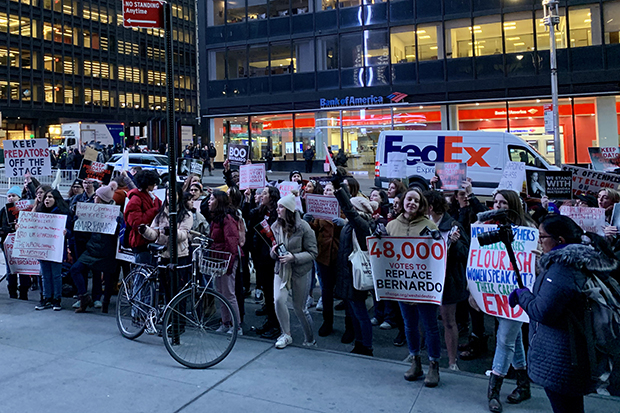
(© Zachary Stewart)
Is it fair to describe Amar Ramasar as a "predator?"
The case against Ramasar has taken on a life of its own on social media, with individual commenters adding their own dramatic flourishes to Ramasar's obviously uncouth behavior. Labels like "rapist," "sexual predator," and "pedophile" have been affixed to the dancer, and this has particularly distressed Alexa Maxwell, Ramasar's girlfriend and the subject of the lewd photos he sent to Chase Finlay.
On January 31, Maxwell released her own statement defending Ramasar: "The only photograph that was shared by Amar was of me, his girlfriend of nearly five years. I knew about the photos of me when they were taken, and while sharing it privately with a close friend was a misstep in judgement, Amar immediately told me when he sent them to Chase and his sincerest regrets have led us to today, where we reside together and are building a loving and happy relationship."
She was unequivocal in her denunciation of some of the online language about Ramasar, stating, "Amar never raped anyone — and Alexandra in her lawsuit does not allege that he did. Amar is not a sexual predator — and Alexandra in her lawsuit does not allege that he is. And Amar is no pedophile — and Alexandra in her lawsuit does not allege anything like that." But based on the language I heard at the protests last night (and still read on comment threads), it seems like a lot of people aren't listening to her.
"Am I supposed to replace him in the show? I'm not gonna do that."
West Side Story faced backlash when they hired a dancer who was named in a civil suit alleging he participated in an exchange of explicit photos of female dancers, which he contests. https://t.co/KUnZCOL1sX pic.twitter.com/nWdzCNhryA
— 60 Minutes (@60Minutes) February 17, 2020
How are the producers of ‘'West Side Story'' responding?
Like Maxwell, the producers of West Side Story have been steadfast in their support of Ramasar. Last Thursday, they released a statement asserting, "There is zero consideration being given to [Ramasar's] potentially being terminated from this workplace, as there has been no transgression of any kind, ever, in this workplace. The West Side Story Company does not as a practice terminate employees without cause. There is no cause here."
Lead producer Scott Rudin reiterated a version of this on 60 Minutes last Sunday, stating, "I think what he did was really stupid. Am I supposed to replace him in the show? I'm not going to do that."
Beyond his enjoyment of Ramasar as a performer, Rudin has good reason not to fire him: The producer was aware of Ramasar's transgression (and reinstatement at the ballet) when he hired him in 2019. If he were to fire him for it now, he would be vulnerable to a wrongful termination claim. Quite simply, Ramasar could sue the temporary tattoos off West Side Story, and he would probably win. That explanation is unlikely to satisfy protesters, however, who wonder why Ramasar was even hired in the first place.
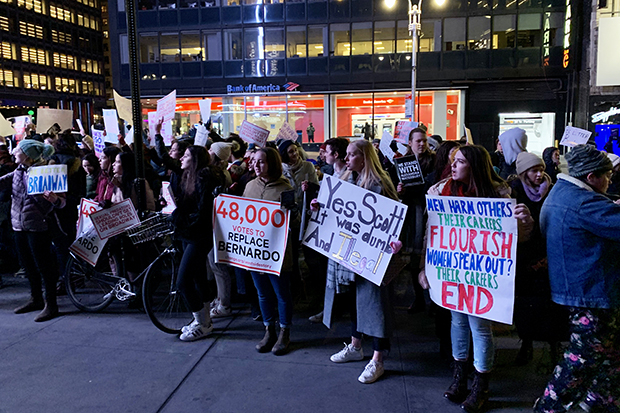
(© Zachary Stewart)
Will the protests continue?
"Oh, they'll definitely continue," Levy said. In the coming days, she plans to release via Twitter an upcoming schedule of protests. "Even if he can't be removed from the cast, we're still going to be out here making sure that we continue having this conversation and making sure that nothing like this ever happens again."
I asked Levy if there was anything the producers could do or say, short of firing Ramasar, that would lead her to call off her protests. Her response was blunt: "No, honestly…what the producers could have done to sate people who are upset about this situation, their timeframe for doing that has already passed."
For Ramasar specifically, Rabin held out the possibility of redemption: "The only thing he can really do at this point is step down, take a break, and apologize," she suggested. "Maybe, at some point, once he has rectified his wrongs, he can find a way to reenter performing."
But Ramasar is currently performing on Broadway. Now that West Side Story has opened to mixed reviews and robust box office, it will be up to ticket buyers to decide if they want to see him or not.










